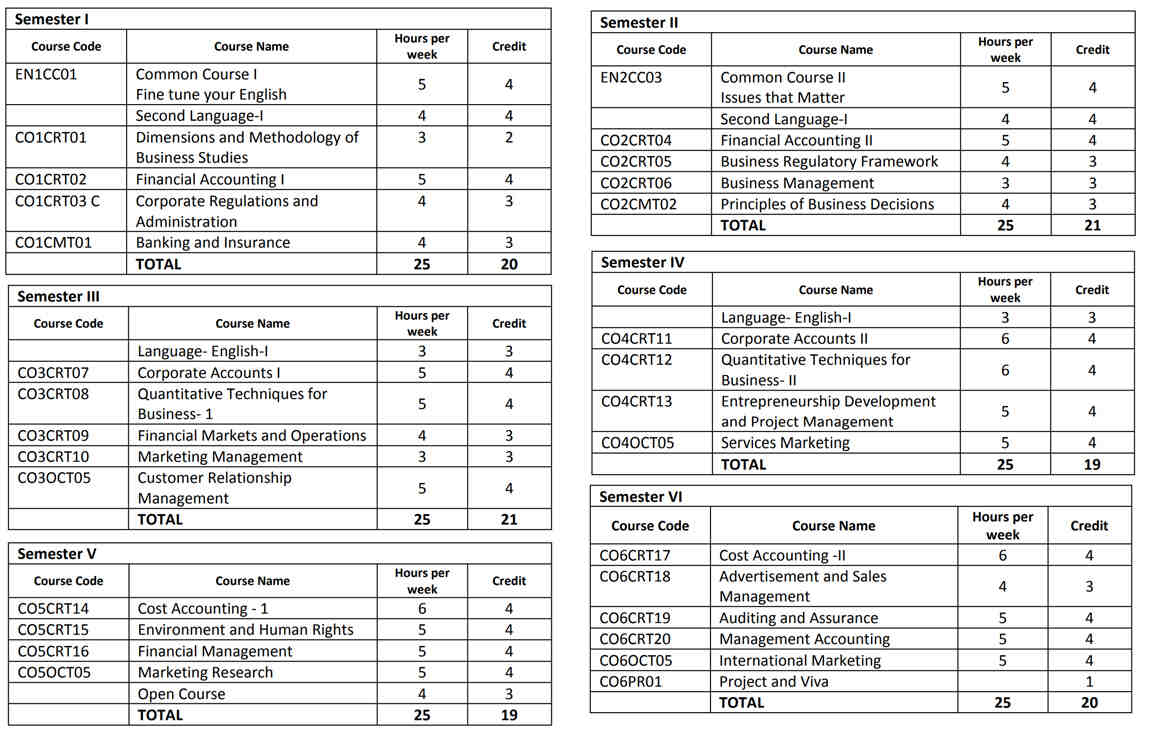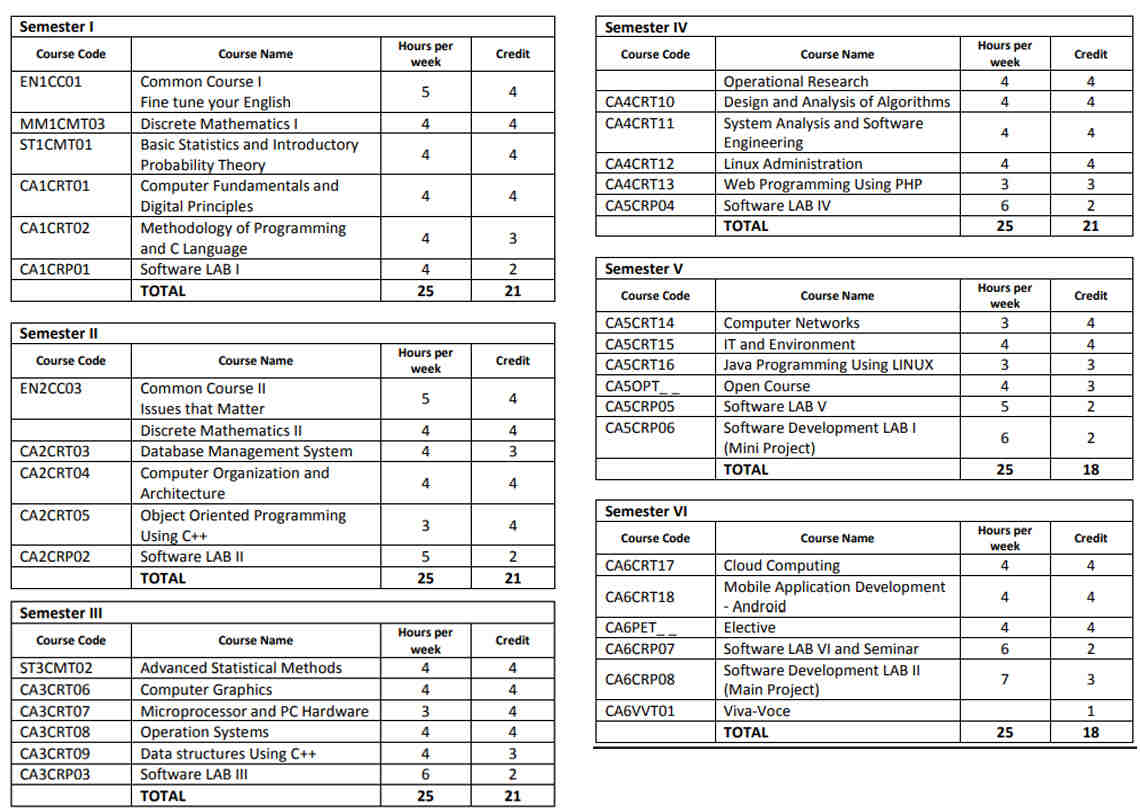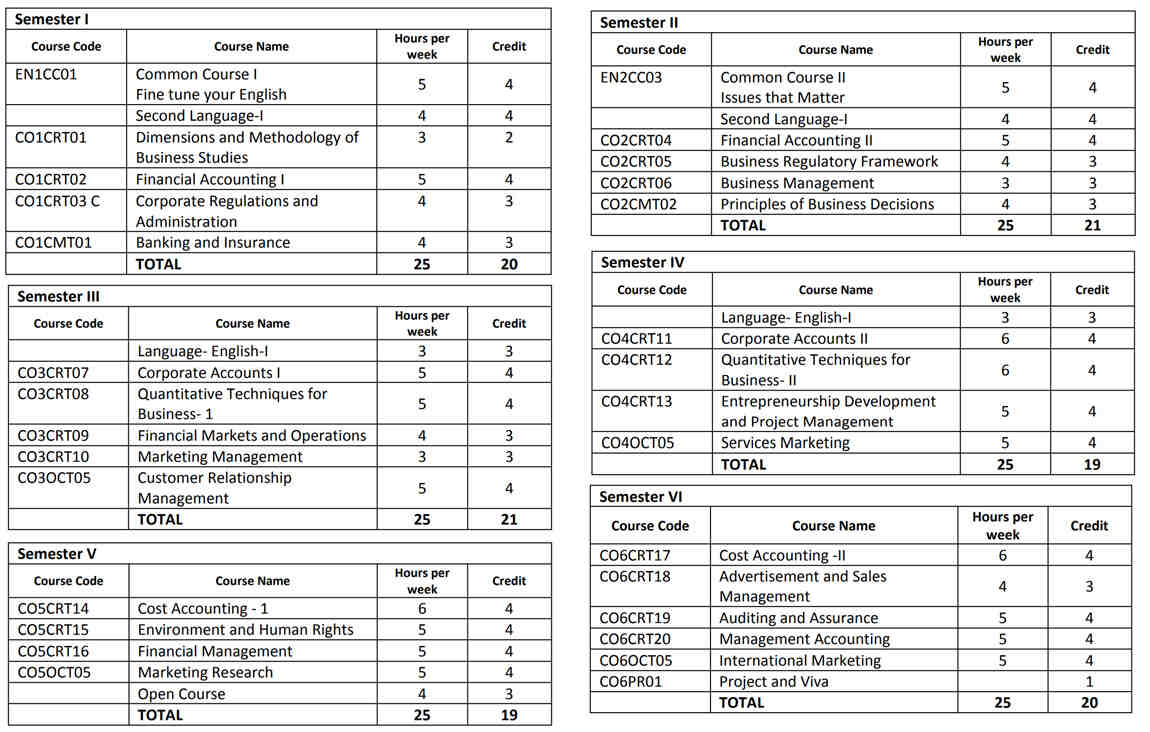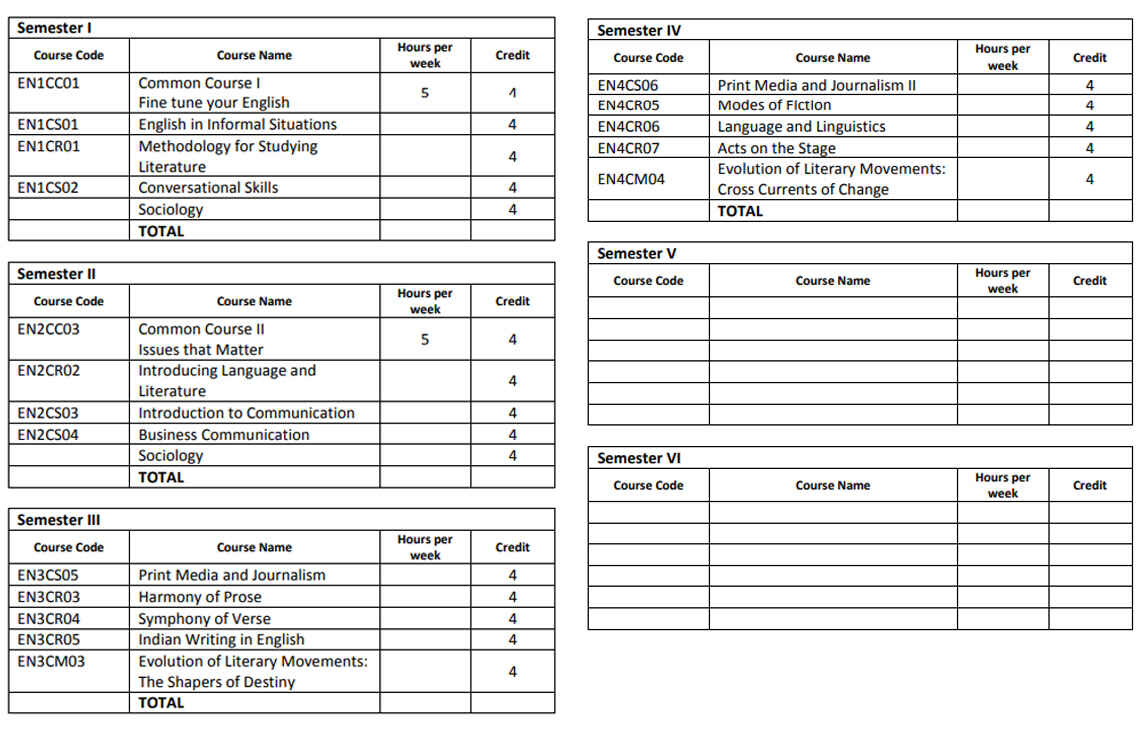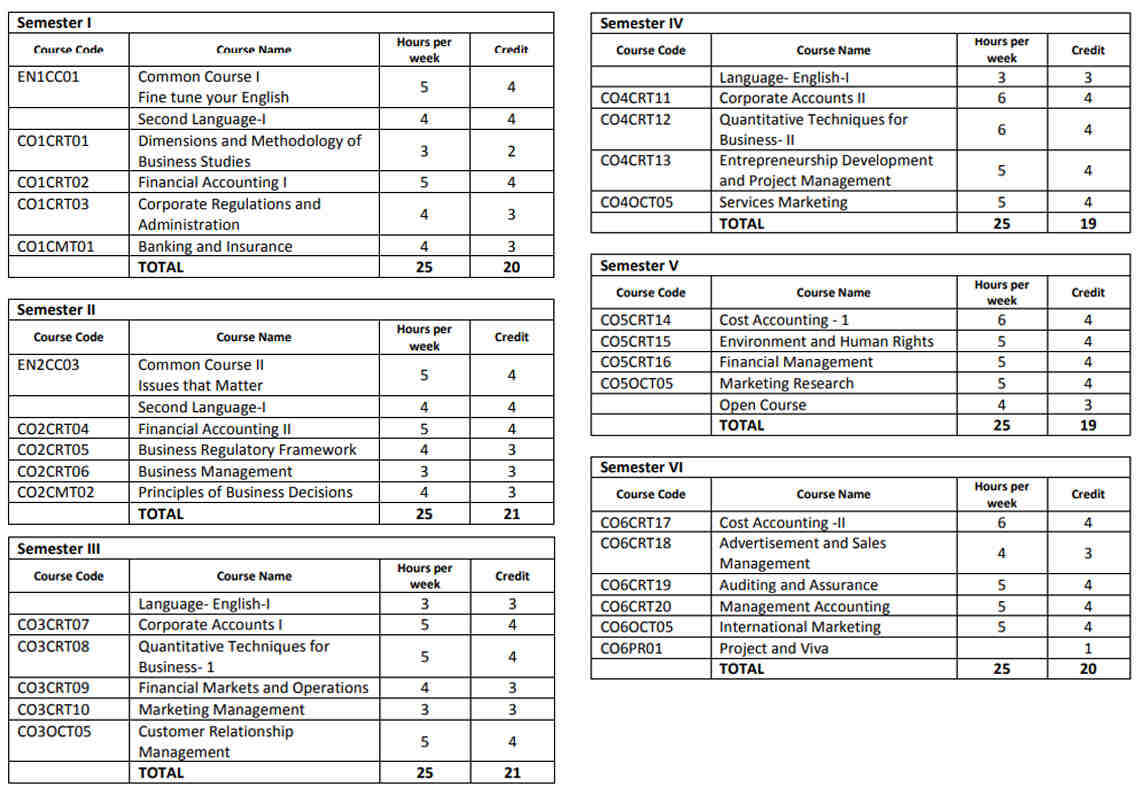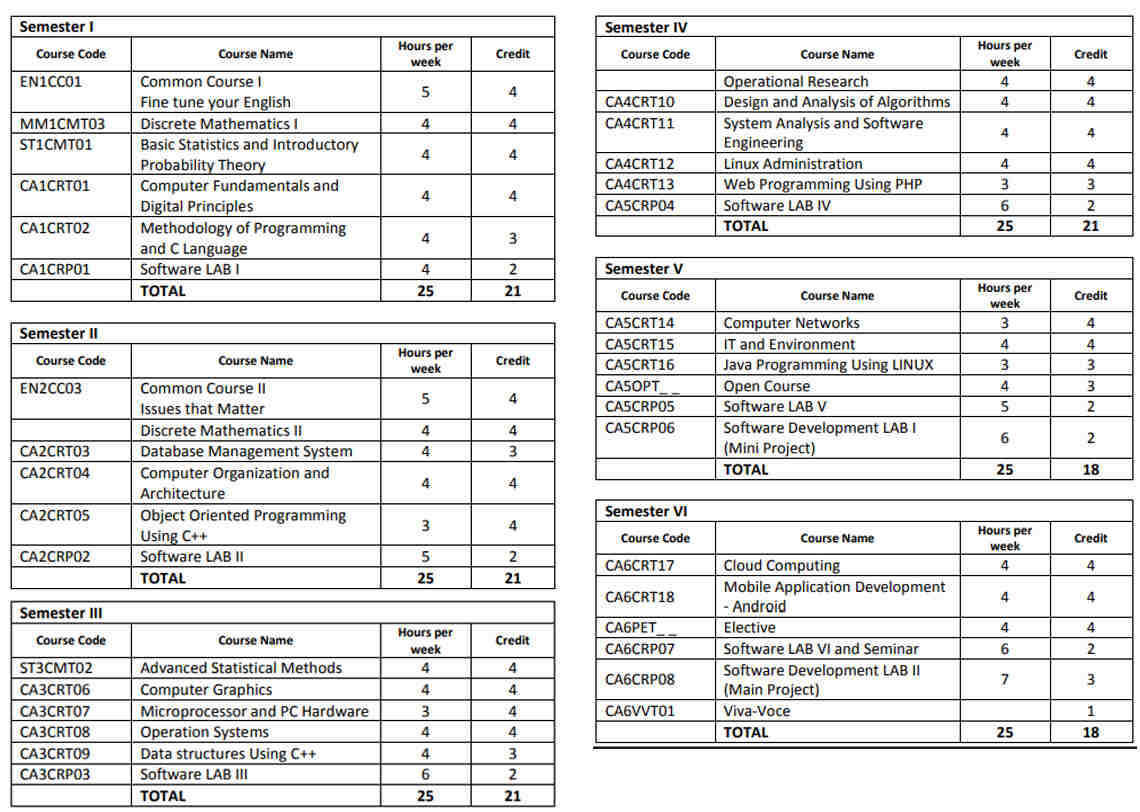Tutorial is an important teaching-learning tool .It helps
learners enhance their intellectual, communication and
social skills.
It is organised for a specific student or to class of a few
students, in which
- Tutor gives individual attention to the students
-
Each class has two tutors who will supervise, guide and
counsel his/her wards
It offers more interactive and specific sessions than a book
or a lecture. It encourages self-paced and self-directed
learning, provides one on one attention and improves
academic performance, self-esteem and confidence.
DURATION
The duration of U.G. programmes shall be 6 semesters. The
duration of odd semesters shall be from June to October and that
of even semesters from November to March. There shall be three
days semester break after odd semesters and two months vacation
during April and May in every academic year. A student may be
permitted to complete the Programme, on valid reasons, within a
period of 12 continuous semesters from the date of commencement
of the first semester of the programme
SCHEME AND SYLLABUS
The U.G. programmes shall include (a) Common courses 1 & 11, (b)
Core courses, (c) Complementary Courses, (d) Open Course.
PROGRAMME STRUCTURE
There shall be a maximum of three credits for the open course
and remaining one credit should be shifted to choice based
course or any other core course
| a |
Programme Duration
|
6 Semesters |
| b |
Total Credits required for successful completion of
the programme
|
120 |
| c |
Minimum credits required from Common Courses |
38 |
| d |
Minimum credits required from Core + complementary +
vocational courses including project
|
79 |
| e |
Minimum credits required from Open Course |
3 |
| f |
Minimum attendance required |
75% |
EXAMINATIONS
The evaluation of each course shall contain two parts. 1.
Internal or In-Semester Assessment (ISA) 2. External or
End-Semester Assessment (ESA) The internal to external
assessment ratio shall be 1:4, for both courses with or without
practical. There shall be a maximum of 80 marks for external
evaluation and maximum of 20 marks for internal evaluation. For
all courses (theory & practical), grades are given on a 07-point
scale based on the total percentage of marks. (ISA+ESA) as given
below:
|
Components of Internal Evaluation
|
Marks |
| Attendance |
5 |
| Assignment /Seminar/Viva |
5 |
| Test paper(s) (1 or 2) (1x10=10; 2x5=10) |
10 |
| Total |
20 |
For all courses with practical
- Marks of theory –External Examination : 60
- Marks of theory –Internal Evaluation : 10
|
Components of Theory – Internal Evaluation
|
Marks |
| Attendance |
3 |
| Assignment /Seminar/Viva |
2 |
| Test paper(s) (1 or 2) (1x5=5; 2x2.5=5) |
5 |
| Total |
10 |
-
Marks of Practical –External Examination: 40 (only in even
semesters)
-
Marks of Practical- Internal Evaluation: 20 (odd and even
semesters combined annually)
|
Components of Practical-Internal evaluation
|
Marks |
| Attendance |
4 |
| Record* |
10 |
| Total |
20 |
*Marks awarded for Record should be related to number of
experiments recorded.
Project Evaluation: (Max. marks100)
|
Components of Project-Evaluation
|
Marks |
| Internal Evaluation |
20 |
| Dissertation (External) |
50 |
| Viva-Voce (External) |
30 |
| Total |
100 |
Attendance Evaluation
1. For all courses without practical
|
% of attendance
|
Marks |
| 90 and above |
5 |
| 85 – 89 |
4 |
| 80-84 |
3 |
| 76-79 |
2 |
| 75 |
1 |
(Decimals are to be rounded to the next higher whole number)
2. For all courses with practical
|
% of attendance
|
Marks for theory
|
| 90 and above |
3 |
| 85 – 89 |
2 |
| 75--79 |
1 |
|
% of attendance
|
Marks for practical
|
| 90 and above |
4 |
| 85 – 89 |
3 |
| 80-84 |
2 |
| 75-79 |
1 |
Note: A separate minimum of 30% marks each for internal and
external (for both theory and practical) and aggregate minimum
of 40% are required for a pass for a course. For a pass in a
programme, a separate minimum of Grade E is required for all the
individual courses. Candidate who secures E grade and above will
be eligible for higher studies.
ASSIGNMENTS
Assignments are to be done from 1st to 4th Semesters. At least
one assignment should be done in each semester.
SEMINAR/VIVA
A student shall present a seminar in the 5th semester and appear
for Viva-voce in the 6th semester.
INTERNAL ASSESSMENT TEST PAPERS
At least one internal test-paper is to be attended in each
semester for each course. The evaluations of all components are
to be published and are to be acknowledged by the candidates.
All documents of internal assessments are to be kept in the
college for two years and shall be made available for
verification by the University. The responsibility of evaluating
the internal assessment is vested in the teacher(s), who teach
the course.
EXTERNAL EXAMINATION
The external examination of all semesters will be conducted by
the University at the end of each semester. Students having a
minimum of 75% average attendance for all the courses only can
register for the examination. Condonation of shortage of
attendance to a maximum of 10 days or 50 hours in a semester
subject to a maximum of 2 times during the whole period of the
programme may be granted by the University on valid grounds.
This condonation shall not be counted for internal assessment.
Benefit of attendance may be granted to students attending
University/College union/Co- curricular activities by treating
them as present for the days of absence, on production of
participation/attendance certificates, within one week, from
competent authorities and endorsed by the Head of the
institution. This is limited to a maximum of 10 days per
semester and this benefit shall be considered for internal
assessment also. Those students who are not eligible even with
condonation of shortage of attendance shall repeat the course
along with the next batch.
All students are to do a project. This project can be done
individually or as a group of 3 students. The projects are to be
identified during the II semester of the programme with the help
of the supervising teacher. The report of the project in
duplicate is to be submitted to the department at the sixth
semester and is to be produced before the examiners appointed by
the University. There will be no supplementary exams. For
reappearance/ improvement, the students can appear along with
the next batch. A candidate who has not secured minimum
marks/credits in internal examinations can re-do the same
registering along with the University examination for the same
semester, subsequently.
PATTERN OF QUESTIONS
Questions shall be set to assess knowledge acquired, standard
application of knowledge, application of knowledge in new
situations, critical evaluation of knowledge and the ability to
synthesize knowledge. The question setter shall ensure that
questions covering all skills are set. He/She shall also submit
a detailed scheme of evaluation along with the question paper. A
question paper shall be a judicious mix of objective type, short
answer type, short essay type /problem solving type and long
essay type questions.

